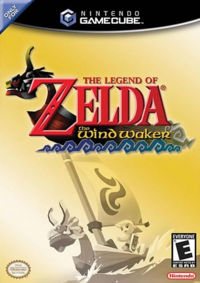Difference between revisions of "The Legend of Zelda: The Wind Waker"
WarioFan63 (talk | contribs) |
(→Legacy) |
||
| Line 32: | Line 32: | ||
=Legacy= | =Legacy= | ||
| + | |||
| + | Although its quality was debated, the cel-shaded style for ''The Wind Waker'' was popular enough to be utilized for most of the handheld games and ''Four Swords'' games which followed. ''[[The Legend of Zelda: Skyward Sword]]'' would later use a cel-shaded style (but mixed with the realism of ''Twilight Princess'') as well as a flying system that is inspired by the sailing in ''The Wind Waker''. | ||
==Sequels== | ==Sequels== | ||
| − | The next ''Legend of Zelda'' game was ''[[The Legend of Zelda: Four Swords Adventures]]'' | + | The next ''Legend of Zelda'' game was ''[[The Legend of Zelda: Four Swords Adventures]]'', while the next major console game was ''[[The Legend of Zelda: Twilight Princess]]'' . ''[[The Legend of Zelda: Phantom Hourglass]]'' was later made as a direct sequel to ''The Wind Waker'' both in story and gameplay (complete with a modified version of the sailing system). |
{{Zelda Series}} | {{Zelda Series}} | ||
[[Category: GameCube Games]][[Category: Zelda Games]] [[Category: Player's Choice]] | [[Category: GameCube Games]][[Category: Zelda Games]] [[Category: Player's Choice]] | ||
Revision as of 14:33, 20 June 2011

| |
| The Wind Waker | |
| Full Title | Legend of Zelda: The Wind Waker |
| Developer | Nintendo EAD |
| Publisher | Nintendo |
| System | Nintendo Gamecube |
| Release Date | Gamecube JP December 13, 2002 US March 24, 2003 EU May 3, 2003 AU May 7, 2003 |
| Gallery | GH Gallery |
| Rating | ESRB: E |
The Legend of Zelda: The Wind Waker is the tenth game in the Legend of Zelda series. The game is known for it's controversial cel-shaded art style.
Story
Several hundred years after the events of The Legend of Zelda: Ocarina of Time, Link is living on Outset Island with his grandmother and sister, Aryll. The legends of the people tell of a prosperous kingdom that housed a golden power. An evil man stole the power and used it to conquer the kingdom until a young hero wearing green sealed him away. He became known as the Hero of Time. The evil returned, but the Hero of Time didn't reappear. No one knows what became of the kingdom.
When boys on Outset Island, they are given clothes like the one the hero wore. As the game starts, Link has come of age. Shortly, Link spots a giant bird taking a girl to the forest at the top of the island. Link goes to rescue her, only to discover Aryll has been kidnapped. Link must now save his sister.
Gameplay
The game is similar in many ways to The Legend of Zelda: Ocarina of Time and The Legend of Zelda: Majora's Mask. The control scheme remains largely the same, including the ability to lock-on to enemies. There are dungeons to be explored and side quests for the persistent player to complete.
A new part of the combat system is the ability on counterattack. While fighting an enemy, a visual cue will appear. Pressing a button at the right time will cause Link to dodge an attack and counterstrike.
Probably the biggest difference is the fact the game takes place in a sea. Because of this, Link has a boat to travel in and gains the ability to control the direction the wind is blowing. Link's ability to control the wind is used in other places as well.
Also interesting is the Tingle Tuner. By connecting a Gameboy Advance to the Gamecube, the player can control Tingle. Tingle has a more detailed map and can sell the player goods and services in a pinch.
Legacy
Although its quality was debated, the cel-shaded style for The Wind Waker was popular enough to be utilized for most of the handheld games and Four Swords games which followed. The Legend of Zelda: Skyward Sword would later use a cel-shaded style (but mixed with the realism of Twilight Princess) as well as a flying system that is inspired by the sailing in The Wind Waker.
Sequels
The next Legend of Zelda game was The Legend of Zelda: Four Swords Adventures, while the next major console game was The Legend of Zelda: Twilight Princess . The Legend of Zelda: Phantom Hourglass was later made as a direct sequel to The Wind Waker both in story and gameplay (complete with a modified version of the sailing system).